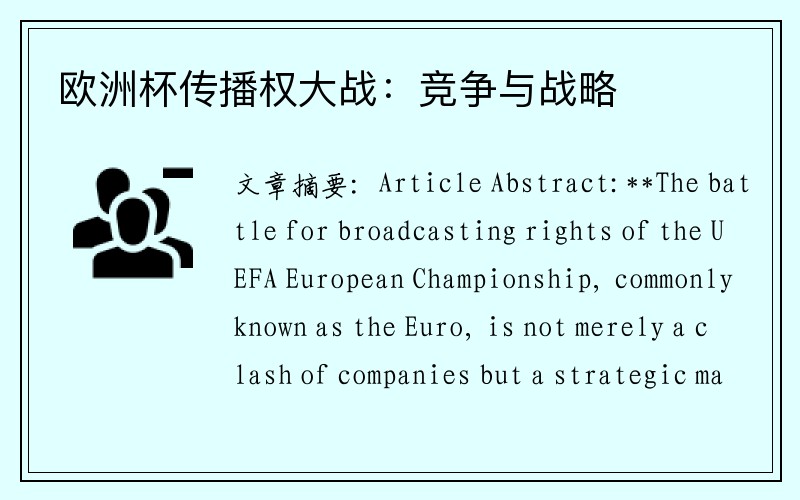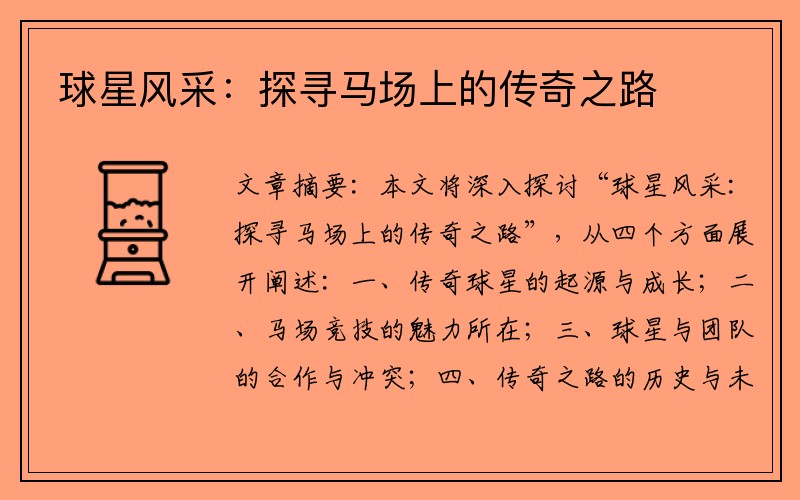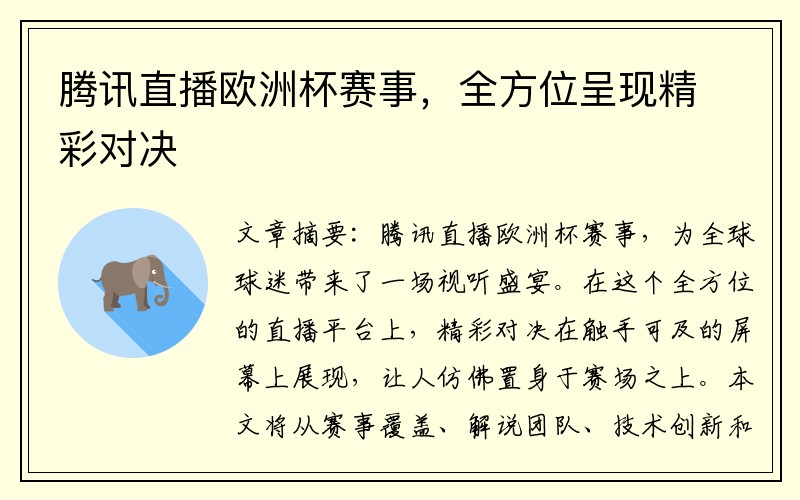
欧洲杯传播权大战:竞争与战略
2024-06-11 11:11:32文章摘要:Article Abstract:**
The battle for broadcasting rights of the UEFA European Championship, commonly known as the Euro, is not merely a clash of companies but a strategic maneuvering to dominate the sports media landscape. This article delves into the intricate competition and strategic considerations surrounding the acquisition of these rights. It explores the motivations, tactics, and implications for stakeholders involved, shedding light on the dynamics of modern sports broadcasting.
1、The Evolution of Sports Broadcasting
The landscape of sports broadcasting has undergone significant evolution over the years, driven by technological advancements and changing consumer behaviors. Traditional television networks have faced stiff competition from digital platforms, leading to a shift in how sports content is consumed and monetized.

The emergence of streaming services has disrupted the traditional broadcasting model, offering viewers greater flexibility and accessibility. This has intensified the competition for exclusive rights to marquee sporting events like the UEFA European Championship, as broadcasters vie to attract subscribers and advertisers in a crowded market.
The Euro has become a coveted asset for broadcasters seeking to enhance their content offerings and expand their audience reach. The tournament's broad appeal and passionate fan base make it a valuable commodity in the fiercely competitive sports media landscape.
2、Strategic Considerations in Acquiring Rights
Securing broadcasting rights for the UEFA European Championship entails careful strategic planning and considerable financial investment. Broadcasters must weigh various factors, including audience demographics, advertising potential, and long-term growth prospects, in determining the value of these rights.
爱游戏官网登录For incumbent rights holders, retaining exclusivity is paramount to maintaining their market position and subscriber base. They must be willing to outbid competitors and negotiate favorable terms with tournament organizers to ensure continuity in their coverage.
Challenger broadcasters, on the other hand, face the daunting task of breaking into a highly competitive market dominated by established players. They may employ aggressive bidding strategies or innovative content offerings to differentiate themselves and attract viewers away from incumbents.
3、Impact on Sports Media Landscape
The outcome of the broadcasting rights battle for the UEFA European Championship has far-reaching implications for the sports media landscape. It shapes the distribution of power among broadcasters, influences the pricing of advertising inventory, and impacts the overall viewing experience for audiences.
Winning broadcasters gain a competitive edge in attracting sponsors and advertisers eager to reach the tournament's massive global audience. They can command higher advertising rates and negotiate lucrative partnerships, bolstering their revenue streams and market position.
However, the rising cost of broadcasting rights could lead to escalating subscription fees or advertising rates, potentially pricing out some viewers and advertisers. This could have ramifications for the accessibility and inclusivity of sports media, raising concerns about the commercialization of elite sporting events.
4、Strategies for Success
In the fiercely contested arena of sports broadcasting, success hinges on a combination of strategic foresight, financial resources, and content innovation. Broadcasters must anticipate market trends, adapt to evolving consumer preferences, and invest in cutting-edge technology to deliver an immersive viewing experience.
Building a strong brand identity and cultivating a loyal fan base are also critical for long-term success. Broadcasters must engage with viewers across multiple platforms, foster community interaction, and deliver compelling content that resonates with diverse audiences.
Ultimately, success in the Euro broadcasting rights battle requires a comprehensive approach that balances financial prudence with strategic vision, enabling broadcasters to capitalize on the tournament's immense popularity and cement their position in the competitive sports media landscape.
Conclusion:
The battle for UEFA European Championship broadcasting rights is emblematic of the broader competition and strategic maneuvering within the sports media industry. It reflects the evolving dynamics of sports consumption, the growing influence of digital platforms, and the intensifying rivalry among broadcasters vying for audience attention and advertising dollars.
As the competition for exclusive rights to marquee sporting events continues to escalate, stakeholders must navigate a complex landscape fraught with challenges and opportunities. By understanding the motivations, tactics, and implications of the broadcasting rights battle, broadcasters can position themselves for success in an increasingly competitive and dynamic environment.

